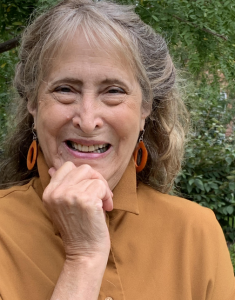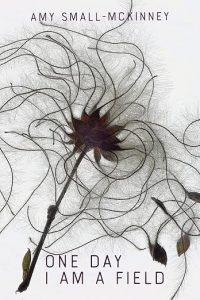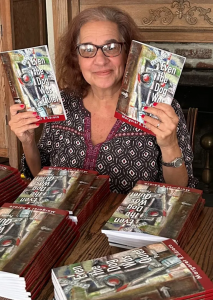

One Day I Am A Field by Amy Small-McKinney
Review By Margaret R. Sáraco
Author Amy Small-McKinney wastes no time inviting us to enter a world of grief as she accompanies her husband on a journey who has been living with dementia. The poet is a consummate storyteller. Most of the poems are set in and around their home and medical facilities and the timeframe is during the pandemic in 2020. Therefore, their ability to move about is limited, which affects their lives greatly because of the anxiety of living in uncertain times, in addition to her husband’s illness. She dedicates One Day I Am A Field to Russ’ memory, who sadly dies of Covid. While Small-McKinney is losing her husband, the reader becomes an observer. Their story unfolds in ordinary places where extraordinary things are occurring in a sensitive landscape. Throughout the collection, she remembers for herself first and then for her husband.
In her opening poem, “The Doctor Said We Need to Return In Two Months After Further Testing Including Bloodwork,” she writes, “How do I mourn a husband who sits beside me?/Who cannot remember.” Feelings range from love and care to fear, frustration, and despair. It is in this space the poet finds grief, patience and sometimes encounters regret. In “During The Pandemic You Are Dying At Home,” her use of repetition emphasizes what the illness means for both, their isolation littered throughout the book. We venture with husband and wife down an unflinching road.
This is not the life I planned.
Now the sky closes its doors and trees shrink
into fetal positions. Your body shrinks.
You forget where you are where
you are going. Your hospital bed tries to explain:
You don’t belong anymore.
This is not the life we planned.
We are breezeless our window won’t open.
She moves from “This is not the life I planned” to “This is not the life we planned” recognizing the I and we in their relationship moving the reader along towards their final goodbyes.
Many of her images and metaphors are startling and beautiful. In “Clematis Vitalba,” a reference to the familiar climbing flowery vine, known as “old man’s beard” or as Small-McKinney references, “Traveller’s Joy” ushers in much more than flowery thoughts.
I want to bury myself inside the dark. Stand aside
invented light. While the world falls apart,
my husband’s brain swells with lakes.
Small-McKinney’s artistic prowess is apparent throughout her book. Not only does she express her day-to-day struggles, and her husband’s, but does so while wielding and winding language to fit her experiences and then in her work embodies the love and care of someone who is slowly fading away. “My husband’s brain swells with lakes” is a remarkable line that lingers even as you move to the next page, the next poem and long after the book is read. And, yes, to articulate one’s deepest emotions is what poets do, but it is not a simple task. One could hope for the author it might be healing, and helpful to those who will or have walked similar paths. The poet uses her words like a fluid conduit of thought and sentiment which might makes the reader imagine these poems may have written themselves. For instance, in “Noir” McKinney makes a leap from memories of her mother who confesses, “I didn’t hold you enough, uncomfortable with touch” to the writer’s desires concerning her daughter:
When my daughter was born, I held her
as a cloud holds on to rain as long as it can
Later in the same poem, she brings us into a reflection with her husband, sounding a seed of regret and connecting the dots between the generations. There is never enough time, and her realization is poignant with the line, “I don’t hold him enough.”
And since skin on skin breaks open all sorrow—
no—a turning away or fear of becoming
him, I don’t hold him enough.
The poet’s transition moving away from him as he grows more ill, is heart wrenching and honest. In “Devotion” she tells the reader of how life used to be. These thoughts and ideas are relatable to those who have experienced grief. Her careful spacing leaves emptiness where something existed before.
Our daughter was born just before my body closed. Her father wore face paint—
characters in plays they acted out together. Danced in the living room to Springsteen,
feet on feet. How it was.
Last night I moved into became a guest in my own life.
A stranger, no longer my home.
About a third of the way into her book, Small-McKinney includes seven poems with similar titles. Five are called “Grief,” another “A Woman Named Grief” but it is her poem, “Grief: Two Parts” in which the poet comes to terms with her husband who is almost gone and then gone within the confines of the poem. And there are additional spaces for grief in much of her work. In the title poem of the collection, “One Day I Am A Field.” She writes,
What is remembered when blinded?
Try to wake to the sun’s flash of denial.
The problem: I am grief’s land.
One Day I Am A Field is a book where heart and poet meet with profound insight on what is it like to be a caregiver to someone you love, losing them one poem at a time. The love she expresses makes the going that much harder, but the reader will feel richer from having shared Small-McKinney’s experience.
Amy Small-McKinney is the author of two full-length books and three chapbooks. Her newest chapbook, One Day I Am A Field, was published by Glass Lyre Press (April,2022). Her second full-length book of poems, Walking Toward Cranes, won the Kithara Book Prize (Glass Lyre Press, 2016). Small-McKinney’s poems also appear in several anthologies, for example, Rumors, Secrets, & Lies: Poems about Pregnancy, Abortion, & Choice (Anhinga Press, 2023). In 2019, her poem “Birthplace” received Special Merits recognition by The Comstock Review for their Muriel Craft Bailey Poetry Contest, judged by poet, David Kirby, and again, in 2021 for her poem, “Bench, Ducks, & Inn,” judged by poet, Juan Felipe Herrera. On 10/2/23, her poem “Love/Furious” appeared in Verse Daily. Her poems have also been translated into Korean and Romanian. Her book reviews have appeared in journals, such as Prairie Schooner, Philadelphia Stories, and Matter. Small-McKinney has a degree in Clinical Neuropsychology from Drexel University and an MFA in Poetry from Drew University. She resides in Philadelphia, where she has taught community poetry workshops, both privately and as part of conferences, as well as independent students.

Margaret R. Sáraco (left) writes about love, family, politics, and nature. A poet, short story, and memoir writer, she grew up in New York and lives in New Jersey. Margaret began her professional writing career as a magazine columnist writing about feminism, music, health, and contemporary events. Her writing has appeared in many anthologies and journals. Margaret’s poetry was nominated for a Pushcart Prize and twice received Honorable Mentions in the Allen Ginsberg Poetry Awards. Her debut poetry collection, If There Is No Wind (Human Error Publishing, 2022) is available where books are sold. Even the Dog Was Quiet will be published in the Fall 2023.